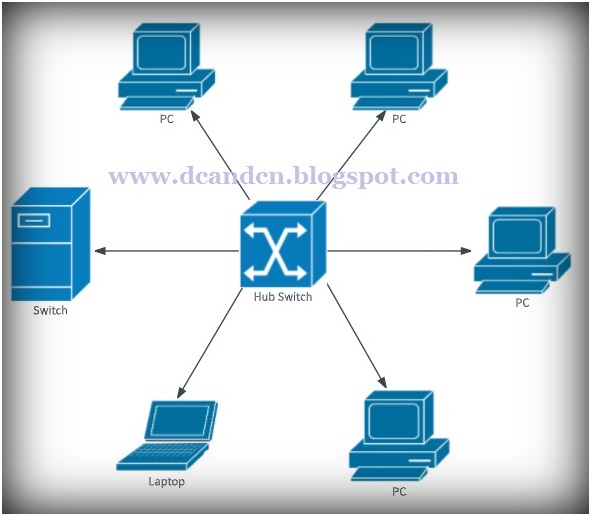- A computer network is a collection of computers that are linked together so that one computer can communicate with another and share resources, data, and applications.
- A computer network is a collection of two or more computers that are linked together to exchange data electronically.
- A computer network can be categorized in form of their size. A computer network can be classified into four types-
- LAN(Local Area Network)
- MAN(Metropolitan Area Network)
- WAN(Wide Area Network)
- PAN(Personal Area Network)
Local Area Network
- A local area network, sometimes known as a LAN, is a network that connects computers in a small region. This might happen in a classroom, an office, or even your own house.
- The term "local area network" refers to a computer network that spans an entire building and is managed by a single administrative system (LAN).
- LAN often includes the offices, schools, colleges, and universities of a company. The number of systems connected in a LAN might range from two to sixteen million.
- A local area network (LAN) is a good mechanism for end users to share resources.
- Printers, file servers, scanners, and the internet are all easily shared between computers in a network.
 |
| LAN |
- A local area network (LAN) connects two or more computers using a communication means such as twisted pair or coaxial cable.
- It is less expensive since it is made up of low-cost components such as hubs, network adapters, and Ethernet cables.
- In a Local Area Network, data is exchanged at an exceedingly fast rate.
- A higher level of security is provided by a Local Area Network.
- LANs are made up of low-cost networking and routing hardware. Local servers that serve file storage and other locally shared applications may be present. It generally uses private IP addresses and doesn't use a lot of routing. The LAN operates under its own local domain and is managed from a central location.
- Ethernet or Token-ring technology is used in LANs. The most extensively used LAN technology is Ethernet, which has a Star topology, whereas Token-ring is rarely seen.
- A LAN can be wired, wireless, or both at the same time.
Metropolitan Area Network
- A metropolitan area network (MAN) is a network that connects multiple LANs to form a larger network that covers a greater geographic area.
- The Metropolitan Area Network (MAN) is a type of cable television network that extends throughout a city. Ethernet, Token-ring, ATM, or Fiber Distributed Data Interface are some of the options (FDDI).
- Metro Ethernet is a service provided by Internet service providers (ISPs). Users can use this service to expand their Local Area Networks. For example, MAN can assist a company with connecting all of its offices around a city.
 |
| MAN |
Metropolitan Area Network Applications:
- The Metropolitan Area Network (MAN) is used to communicate amongst banks in a city.
- It can be used in a city-based college.
- It can also be used for military communication.
- It can be used to make a reservation for a flight.
Wide Area Network
- A wide area network (WAN) is a network that spans a vast geographic area, such as many states or countries.
- The Wide Area Network (WAN), as the name implies, covers a large area that may span provinces or perhaps the entire country. Telecommunication networks are often Wide Area Networks.
- These networks connect MANs and LANs together. WANs need very expensive network equipment since they have a very high-speed backbone.
 |
| WAN |
- Asynchronous Transfer Mode (ATM), Frame Relay, and Synchronous Optical Network are examples of sophisticated WAN technology (SONET). Multiple administrators may be in charge of the WAN.
Personal Area Network
- A Personal Area Network (PAN) is a network that is set up within a single person and normally has a range of 10 metres.
- The term "Personal Area Network" refers to a network that is used to connect personal computing devices.
- A Personal Area Network (PAN) is the smallest network that a user can access. Bluetooth-enabled or infrared-enabled gadgets may fall within this category. PAN has a 10 metre range of connectivity. Wireless computer keyboards and mice, Bluetooth-enabled headphones, wireless printers, and TV remotes are all examples of PAN.









Very informative article on the different types of computer networks! The way you explained LAN, MAN, WAN, and PAN with examples makes it really clear for learners. For those who also enjoy experimenting with software and mods, you can explore tools like script hook v dotnet download to enhance your practical skills.
ReplyDelete